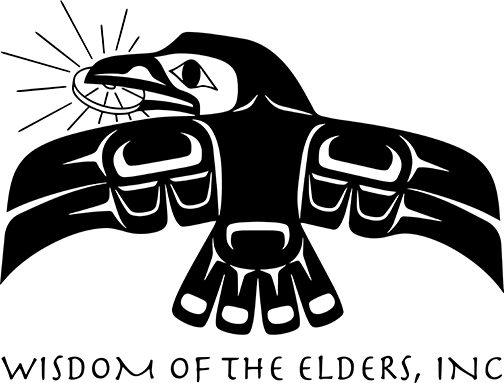Kevin Locke
with Milt Lee
Arlie Neskahi :
On today’s Contemporary Rhythms, Milt Lee travels to Wakpala, South Dakota to visit with Lakota and Anishinabe hoop dancer and flute player, Kevin Locke.
Milt Lee:
Anyone who has browsed through Native music titles has seen Kevin Locke’s music. He plays flute, lots of different flutes, but he also sings traditional songs. With his roots planted in Lakota tradition, Kevin keeps the culture alive by stretching out. Last year, he created a really new sound, unlike anything we’ve heard before.
Music:
Kevin Locke – Contemporary flute and drums and guitar
What a sound! To hear old music making its way into the modern world fascinates me. To learn more, William Ward and I cruise over to Kevin’s place on one of our trips to chat about what
he is doing.
Locke:
Come in, come in, come in. Come on down.
Lee:
Kevin greets us at the door.
There is something fine about seeing a man in the center of his life. But it was also great to find out what this new album, Midnight Strongheart is all about.

Kevin Locke. Lakota traditional style flute player and hoop dancer. Photo courtesy of Makoche Recording. www.makoche.com
Locke:
You know, I have been wanting to do that for a long time, a recording project where we could incorporate all these modern idioms, you know music idioms, you know, like try and take some of these traditional tunes, composition, and express it in a modern idiom like whether it is blues, or rock, or anything like that.
Music:
We were scouting around for somebody that could really help us with that type of collaboration for quite a long time and we finally found the right perfect mix. And there is a guy. He lives in Ojai, California. His name is Jim Killeary and he is well credited on that recording.
You know, I had all these tunes and so I took all these tunes to him, you know, and I went through all the tunes and explained everything to him and we just had a big kind of like a brain storming session. It involved quite a few trips for me to California for me. And some of the recordings in there, some of the tunes in there, are like the result of that. And some of them are really extemporaneous.
Lee:
The sound is rich in Kevin’s music. Everything from rock to zidako to blues, but all of it is based on traditional songs that he learned years ago.
Well, for instance now, there is that blues piece. And that one, it is really an old song. In fact, there is two tracks on there. And one of them is a short vocal interpretation of the song according to the traditional composition of it. Then, right after it is the modified version. And I’ve got it on the liner notes, but if you listen to the song, you are going to hear, it is going to say. It is a real old song, but it says, you know (spoken in Lakota) that is what that song is saying there.
It is saying. The person is saying, “The people, you see me, you will look at me. You will see that I really cherish my Indians ways. This is my love, my heart’s desire. But you see, because of this, I am experiencing difficulties.”
So I think this song has a lot to say about the early reservation period, this whole process of acculturation and the heartbreak people experienced trying to keep on hold onto their good ways, you know, and yet finding that this is really difficult in the face of the dominant civilization, or dominant culture.
Music:
Buffalo Dance
I used to travel around with this group from ah, Rosebud there. The um, ah, it was Ben Black Bear, Sr. and Lloyd One Star and the Old Iron Wood Singers. And, and a group of us you know, we performed different traditional dances. In one of the song, in one of the dances was a buffalo dance. Nobody’s used it. You know, it’s been like thirty years since I’ve heard them sing it. So then, I just love that tune. And so then I thought, well, I’ll use it, you know. I’ll use it. It’s a beautiful song and what it’s saying is it’s about the force that moves the buffalo over the country.
Lee:
Music, whether traditional or contemporary, comes from life. It’s part of what draws me to the evolving tunes in Indian country.
In some songs, Kevin blends his traditional music with the writings of the Baha’i faith. This song, Abou Abou, is a lullaby. When translated, some of the lyrics say:
And may your dreams be full of delight
And may you always smile
And may your life be full and complete.
My favorite song on Midnight Strongheart is Silent Love. It is a short Lakota song that means, “I love you. I love you. I love you. But for now we have to keep it a secret.”
This album, Midnight Strongheart, should be off the charts. As I listen to it more and more, I hear the layers and I hear the life.
Kevin’s Lakota name means the First to Arise.
Locke:
So I just tell everybody. You know, people ask me about my background. And I tell them, “I am just a member of the human being tribe.” Yeah. And if you check out in the Lakota language, when they refer to people, they refer to Wahunpa, two legged ones. I am just a member of the human being tribe.”
Lee:
From Wakpala, South Dakota, this is Wisdom of the Elders.
Neskahi:
Contemporary Rhythms is written and produced by Milt Lee of the Cheyenne River Sioux tribe and his wife, Jamie Lee, who live and work in Rapid City, South Dakota. Check out their website, realrez dot com for more of their work.


